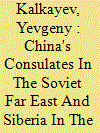| Srl | Item |
| 1 |
ID:
172616


|
|
|
|
|
| Summary/Abstract |
The paper examines the position of the Republic China consulates in the Soviet Union in 1937-1938. During the Great Terror period. Chinese consulates found themselves in an ambiguous position. On the one hand, they represented a friendly state and were not closed down as many other foreign consulates were at the time. But on the other, NKVD charged many of their staff with working for the Japanese intelligence service, while the consulates' efforts to protect their nationals were viewed by the Soviet side as hostile.
|
|
|
|
|
|
|
|
|
|
|
|
|
|
|
|
| 2 |
ID:
189181


|
|
|
|
|
| Summary/Abstract |
IT SOMETIMES happens that history itself evaluates what a specific individual has done. A case in point is Igor Rogachev, a renowned Soviet and Russian diplomat who played a tremendous role in bolstering our country's positions in the Asia-Pacific region (APAC) and in reforming the former Soviet Union's, and subsequently Russia's, relations with China, where he served as the ambassador of the Russian Federation for 13 years.
|
|
|
|
|
|
|
|
|
|
|
|
|
|
|
|
| 3 |
ID:
185056


|
|
|
|
|
| Summary/Abstract |
The year 2009 saw the publication in Russian of the memoirs of former Soviet Foreign Minister and Georgian President Eduard Shevardnadze, which contained an "astonishing" episode of a long argument he had with Deng Xiaoping over border and territorial issues during a February 1989 visit to China. Shevardnadze claimed that Deng expressed the view that vast expanses of the Soviet Union - three to four million square kilometers - belonged to China. These words of Deng in Shevardnadze's memoirs have been cited as an argument in works by many historians of different countries. However, this recollection is not backed by any additional proof. Moreover, many details of this account contradict known historical facts or are entirely illogical. There are grounds for believing that this episode in Shevardnadze's memoirs is an erroneous or even false memory. Neither can the possibility be excluded that it was adeliberate fabrication. This episode can therefore not be considered a reliable source for citation. At the Soviet-Chinese summit, Deng did indeed say that in the past, Russia and the Soviet Union took millions of square kilometers of land from China. At the same time, however, he promised the Soviet leader that China would not make any territorial claims. From the mid-1980s on, Deng Xiaoping actively supported the most rapid settlement possible of Soviet-Chinese border issues through negotiations. This meant that 99% of the border between Russia and China was delimited on a legal basis in the final years of Deng's life. Russian-Chinese border issues have now been settled once and for all. Academic studies and debates on issues associated with territories and borders in the history of Soviet-Chinese relations can of course continue. However, research and discussion must be based on reliable sources and be purely academic in nature.
|
|
|
|
|
|
|
|
|
|
|
|
|
|
|
|